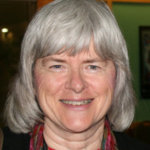Interviewer: Chris Petersen
Interview Date: May 29, 2019
Location: Strand Agricultural Hall, Oregon State University
Duration: 2:07:34
In the interview, Stella Coakley, emeritus associate dean of the College of Agricultural Sciences, describes her childhood, education in plant pathology, and how her career ultimately brought her to Oregon State University. Coakley begins by describing her childhood growing up on a farm in Modesto, California, and her early experiences in agriculture, managing a retail direct-to-public market near her home and helping on her family’s farm. She also explains some of the political and social dynamics in her community, such as her parents’ involvement in local politics. Then she recalls her education at Modesto Junior College and the University of California Davis and why she decided to study plant pathology. Coakley also notes her experiences as a woman Ph.D. candidate in the sciences.
From there, Coakley recounts how she moved to Colorado with her husband to work at the University of Denver, and later her fellowship with the National Center for Atmospheric Research. She describes her early research into the effect of climate change on crops, and how she began studying stripe rust in Pacific Northwest wheat crops. Coakley next explains what drove her to apply for the position of chair of the Botany and Plant Pathology department at Oregon State University, describing the state of the department when she was first hired in 1988, and the people she worked with.
Reflecting on her OSU years, Coakley discusses her achievements as department chair, and later as OSU Faculty Senate President and as Associate Dean for the College of Agricultural Sciences. She likewise provides an overview of her work on the university space committee and the challenges that OSU encountered while she was in administration. She discusses her colleagues Roy Arnold and Ed Ray, among others, and their contributions to the university. She concludes the interview by commenting on OSU’s future and the work that she does as a mentor and resource for younger faculty.
Dublin Core
Title
Description
From there, Coakley recounts how she moved to Colorado with her husband to work at the University of Denver, and later her fellowship with the National Center for Atmospheric Research. She describes her early research into the effect of climate change on crops, and how she began studying stripe rust in Pacific Northwest wheat crops. Coakley next explains what drove her to apply for the position of chair of the Botany and Plant Pathology department at Oregon State University, describing the state of the department when she was first hired in 1988, and the people she worked with.
Reflecting on her OSU years, Coakley discusses her achievements as department chair, and later as OSU Faculty Senate President and as Associate Dean for the College of Agricultural Sciences. She likewise provides an overview of her work on the university space committee and the challenges that OSU encountered while she was in administration. She discusses her colleagues Roy Arnold and Ed Ray, among others, and their contributions to the university. She concludes the interview by commenting on OSU’s future and the work that she does as a mentor and resource for younger faculty.

